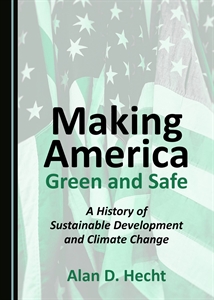-
Book Review: “Making America Green and Safe” Explores History of Sustainable Development and Climate Change
 In his book, Making America Green and Safe: A History of Sustainable Development and Climate Change, Alan Hecht offers an insider’s account of the years that shaped sustainable development and climate change policy in the United States. The arc of Hecht’s career spans the evolution of the modern environmental movement. Serving for more than 40 years in the U.S. government, he devoted his career to environmental protection and sustainable development. The stories he tells reflect his belief that “history is a critical part of future planning.”
In his book, Making America Green and Safe: A History of Sustainable Development and Climate Change, Alan Hecht offers an insider’s account of the years that shaped sustainable development and climate change policy in the United States. The arc of Hecht’s career spans the evolution of the modern environmental movement. Serving for more than 40 years in the U.S. government, he devoted his career to environmental protection and sustainable development. The stories he tells reflect his belief that “history is a critical part of future planning.”
In what may seem a paradoxical start today, Hecht began his work in environment at now West Georgia University with none other than Newt Gingrich. Hecht and Gingrich actually jointly conducted a land use study for Harris County, Ga., applying new methodologies of land use analysis to prevent urban sprawl. As House Speaker in the 1990s, Gingrich attempted to gut the very environmental protections Alan was helping to put in place. After a career at various federal agencies, Hecht led the Environmental Protection Agency’s (EPA’s) research activities on sustainability since 2003.
He opens by telling the history of the genesis of American environmental policy. In the 1960s and 1970s, rivers catching on fire, smog alerts, and badly polluted waters and air all over the country led the American public to demand federal regulatory action. In response, a bipartisan Congress, often led by Republican presidents, passed landmark U.S. laws for clean air, clean water, and waste management. Among his many jobs, Hecht served as the first director of National Science Foundation’s Climate Dynamics Program, overseeing research funding in atmospheric science and climate modeling in the 1970s. By the 1980s, he moved to National Oceanic and Atmospheric Administration (NOAA) to direct the National Climate Program Office.
Hecht concludes his book by asking the following question: “Are you optimistic or pessimistic about the future?” According to him, the direction of efforts in the near future will largely depend upon the following scenarios:
- Can the Federal Government and Congress converge on sound environmental and economic policies?
- Can governments around the world work together to achieve a safer and more sustainable future?
- Can we deal with abating future climate change?
Hecht remains optimistic about the future even as political will for sustainability seems to be withering. He believes wisdom will ultimately prevail and rightly so for one reason. Environmental policy is not limited to the Federal Government’s ambit anymore. Increasingly, multi-agent cooperation at the state level is becoming relevant along with meaningful participation from the private and the philanthropic sectors.
Hecht writes that one of the goals of his book is to enhance public understanding of sustainability. By documenting the evolution of U.S. environmental awareness, from confronting pollution and waste management through legislation like the Clean Air and Water Acts and Superfund to the modern era where businesses and the public sector integrate sustainability, he has performed an important public service. By giving us this history of environmental protection and sustainability in the United States, Hecht is helping today’s practitioners and scholars move this field forward into the 21st century.
Sherri Goodman is a Senior Fellow at the Wilson Center and the Center for Climate & Security, and a former Deputy Undersecretary of Defense (Environmental Security). She is the former CEO and President of the Consortium for Ocean Leadership and the founder of the CNA Military Advisory Board.
Anubha Chopra is an Intern at the Wilson Center.
 A Publication of the Stimson Center.
A Publication of the Stimson Center.

 In his book, Making America Green and Safe: A History of Sustainable Development and Climate Change, Alan Hecht offers an insider’s account of the years that shaped sustainable development and climate change policy in the United States. The arc of Hecht’s career spans the evolution of the modern environmental movement. Serving for more than 40 years in the U.S. government, he devoted his career to environmental protection and sustainable development. The stories he tells reflect his belief that “history is a critical part of future planning.”
In his book, Making America Green and Safe: A History of Sustainable Development and Climate Change, Alan Hecht offers an insider’s account of the years that shaped sustainable development and climate change policy in the United States. The arc of Hecht’s career spans the evolution of the modern environmental movement. Serving for more than 40 years in the U.S. government, he devoted his career to environmental protection and sustainable development. The stories he tells reflect his belief that “history is a critical part of future planning.”

